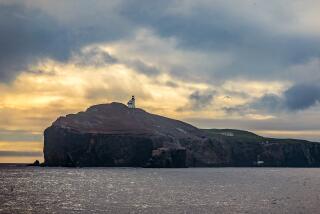Park Closure Unnecessary
- Share via
Caution is commendable but to sanitize our national parks so thoroughly that nothing bad could possibly happen to anyone who visits would defeat their purpose. We share the concern that led Rep. Elton Gallegly (R-Simi Valley) to call for Channel Islands National Park to be closed until officials can devise a better way to warn visitors about a potentially deadly virus carried by mice. Yet with no reports thus far of human infection among the 60,000 people who visit each year, we believe closing the park would be an overreaction.
A better course would be for park officials and the private firms that transport visitors to the islands to step up their efforts to educate people about the hazard and how to avoid it. Beyond that, we believe responsibility rests with the visitors. Anyone who ventures into a natural setting, particularly one as rugged and remote as the Channel Islands, must appreciate the need for different types of caution than required at home. One good rule for adults and children alike: Don’t touch wild animals--whether they are grizzly bears, rattlesnakes or cute mice.
Gallegly’s call came after a deer mouse that a 7-year-old Oxnard boy had been playing with on Santa Rosa Island tested positive for hantavirus antibodies. The boy has not shown signs of illness but is being monitored.
Several wet winters and a decline of natural predators have produced a population explosion of rodents on the Channel Islands. As many as 70% of them on several islands are infected with hantavirus, which can cause a rare but potentially fatal disease in people. The virus doesn’t harm mice but can be transmitted to humans by rodent bites or via dust contaminated by their droppings, urine or saliva.
When The Times first reported the hazard in February, park officials maintained that there was nothing to worry about, saying the type of hantavirus on the islands was not infectious to humans. California’s top health officials pointed out that the island hantavirus was, in fact, the same strain that killed two dozen people near the New Mexico-Utah state line six years ago. They urged the National Park Service to take more precautions to protect employees and island visitors.
Because there is no way to cure the mice of the virus, Channel Islands National Park officials are doing the right thing by warning visitors with signs posted on all of the islands, on the Park Service’s Web page and at the visitors center. In addition, visitors receive written information about the virus when their reservations are confirmed by mail.
Park officials and the private firms that ferry visitors to the islands should reinforce these efforts by giving verbal warnings before and during the boat crossing, and via their reservations phone line.
The lack of human infections so far suggests that visitors who take reasonable precautions are at minuscule risk. Until experience shows otherwise, we believe closing the park would make no more sense than padlocking Yellowstone because its famous bears occasionally bite somebody, or outlawing hiking in Yosemite because of last winter’s tragic kidnap-murder.
More to Read
Sign up for The Wild
We’ll help you find the best places to hike, bike and run, as well as the perfect silent spots for meditation and yoga.
You may occasionally receive promotional content from the Los Angeles Times.






